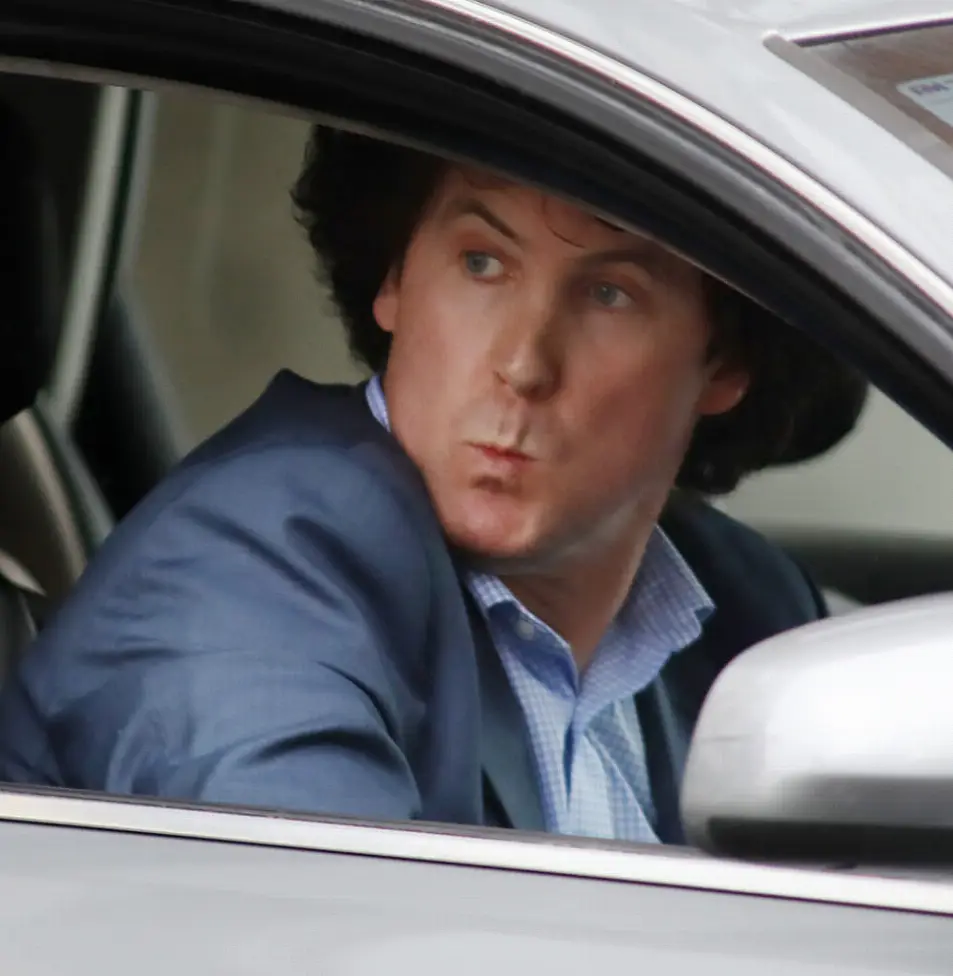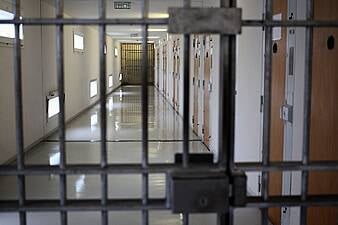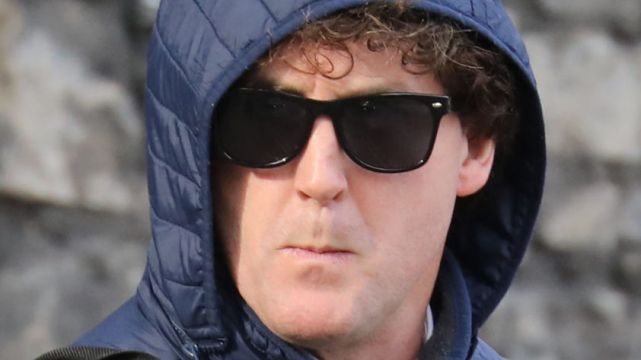A former GAA star has been convicted of a "sneaky" assault on veteran journalist Ray Managh in the Four Courts, which a judge described as a "disturbing" attack on press freedom.
Ex-Cavan footballer Eddie Óg O'Reilly, 43, "badgered" Mr Managh not to publicise his fight against a bank repossession and "lost it", "viciously" attacked the journalist and stole his notebook, Dublin District Court heard.
Finding him guilty, Judge John Hughes characterised as "delusional" O'Reilly's evidence that he was terrified for his life of Mr Managh and news photographers chasing him through the streets of Dublin.
He held that Mr Managh gave a truthful account of the incident and praised him for his magnanimous attitude toward the accused after the verdict.
Sentencing
The self-employed builder with an address at Kilcogy, Mullahoran, Co. Cavan was given a nine-month jail sentence, which was suspended for two years. In addition, Judge Hughes ordered him to pay €3,000 in compensation and a €2,000 fine and to complete an anger management course while on supervised probation.
Mr Managh asked for the compensation to be paid to the Crumlin Children's Hospital cancer research unit instead.
Father of two, O'Reilly, had denied assault causing harm to veteran court reporter Ray Managh and stealing his notebook on May 11th, 2018.
The court heard the former inter-county player pleaded with the reporter not to publicise his case about bank repossession proceedings.
When told "no", he shouldered the journalist, then 75, into a lift and violently pinned him against the walls until he could get his notebook, the court was told.
Ray Managh told Judge Hughes he worked as a journalist for 63 years and covered courts in Dublin for multiple national news organisations.
In his victim impact statement, he said the incident left him in shock and pain. Even during a decade of covering the troubles in the North, he had never been threatened, assaulted, or had his property stolen.
He did not think O'Reilly set out that morning to assault him, but "he simply lost it".
It affected the journalist for months, and he added that he would be worried about other defendants around the courts.
Judge Hughes described the attack as disturbing and sneaky, and the location of the incident, and O'Reilly's sports background were aggravating factors.
The court was cognisant that this was an attack on a journalist doing his job and the importance of the freedom of the press.
"The reporting of civil and criminal cases goes back hundreds of years and is a valuable function in society and needs to be protected," Judge Hughes said.
Noting the accused's circumstances, previous good character and that he had a family to support, the judge suspended the sentence. However, he warned him not to contact the journalist again or breach any of the conditions, or the prison sentence would be activated.
During the hearing, Mr Managh told State solicitor Niall McGinty that he had been covering a Circuit Civil Court case in the Aras Ui Dhalaigh building at the Four Courts on the morning of the attack.

Repossession
It involved the Bank of Ireland's repossession of a €500,000 property co-owned by O'Reilly and his older brother Michael.
Mr Managh said that the brother agreed to give the property back, but "Mr O'Reilly decided to fight it out". He recalled that the accused competently if unsuccessfully, represented himself.
Mr Managh was on the press bench taking it down in shorthand in his notebook while O'Reilly stood five feet away.
He explained that the notebook's monetary value was infinitesimal compared to the content, notes which were vital for a journalist to construct a safe and accurate story.
After the case, they both left the courtroom. CCTV showed them leaving and O'Reilly walking with Mr Managh as he made his way to a lift to exit the building.
He said O'Reilly walked alongside him "pleading with me not to publish the case", and he kept asking him not to report the matter.
"I said, No," the journalist told the court, adding that he also suggested to O'Reilly that he could contact the newspaper editors directly to ask them not to run the story.
He added that was why O'Reilly had his business card to name the reporter in court.
"I made to step into the lift, and he hit me with his shoulder violently against my right shoulder, which hurled me into the lift," the journalist told the court.
He said he was "slammed against the back wall of the lift, and I hit my left shoulder off the wall of the lift".
Notebook
He had his notebook in his left jacket pocket wrapped in a court list, and O'Reilly used his body to keep him pinned against the back and side of the lift.
"He then reached with both hands to the left-hand side of my jacket and grabbed my notebook; this was the same notebook I was using in court," he said.
Mr Managh recalled how he tried to hold on to it, but O'Reilly had a strong grip with both hands, and he expected his jacket would be torn.
"I was very concerned at this stage for my own safety," he said. The lift door kept opening and closing.
He thought he would be in "serious trouble" if it shut, "meaning "I had no idea what he was going to do to me in the secrecy and privacy of that lift which would have acted as a prison for the three floors down I was going to have to travel."
Mr Managh said he was scared and let go of his notebook. O'Reilly stole it by pulling it out of his pocket and running away and down the stairs.
He also recalled phoning news photographer Paddy Cummins, who covers the courts, about O'Reilly leaving, so he could get a photo.
Badly shocked
He said he was 75 at the time and was very badly shocked and shaking. He returned to the courtroom and spoke to the registrar Kevin Bulman who gave evidence that Mr Managh looked "out of sorts", dishevelled and obviously upset.
He was still able to file his story from memory and details from the registrar, who also reported the incident to his supervisor.
Mr Managh suffered stiffness and pain in both shoulders, and he went to a VHI clinic which gave him prescription painkillers and a sling for a week.
Cross-examined by defence counsel Breffni Gordon, he said he often used Google to look up people on the court list, and he may have had a specific interest in O'Reilly's case and others that day.
However, he denied that the news photographers outside were waiting for O'Reilly and said they took photos of everyone entering the building.
Rejecting suggestions that he attempted to "interview" O'Reilly in the court straight after the ruling or ask him about his brother's assets, he said that would never happen and could amount to contempt of court.
He told Mr Gordon was initially polite, but what happened was a "totally premeditated attack" and an"animal act" by O'Reilly, who also used his elbow after shouldering him into the lift in an "ultra-violent incident".
Bridewell Garda Michael McGrath investigated the attack and obtained the security camera footage. It did not cover the area around the lift but captured Mr Managh being followed by the accused in a corridor before the incident.
Garda McGrath told the court he took a report of the assault and located Mr Managh in the Round Hall in the Four Courts shortly afterwards. He remembered the reporter being "totally shook up", and his clothes ruffled.
In evidence, O'Reilly, then 38, claimed the journalist asked him questions about his brother.
He maintained he did not know anything about Mr Managh but thought, "this is a very dangerous man", and he had to get away.
The accused, with no prior criminal convictions, agreed that he made his way out using the stairs and claimed he feared for his safety as he went to his car parked in Smithfield.
He also claimed photographers "bullied, harassed and terrorised" him earlier that morning as he entered the Four Courts.
After the case, he claimed that Paddy Cummins also chased him while he was "fearful for my life" and thought more people were about to harm him.

Mr Cummins had given evidence of getting a picture of him arriving "camera shy". However, he needed a better image and shot one of him driving out of a car park after the case.
O'Reilly claimed, "it was essentially an ambush by these men; that's the way I see it".
He denied the attack and theft of the notebook, which was never recovered, saying, "I never laid a hand on him".
The court heard that O'Reilly, who also has US citizenship, went to America a few months after the incident. However, Garda McGrath obtained directions from the Director of Public Prosecutions to arrest him at Dublin Airport and charge him when he returned a year later.







